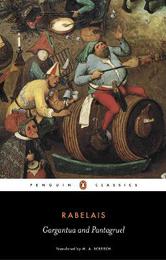
|
Gargantua and Pantagruel
Paperback / softback
Main Details
| Title |
Gargantua and Pantagruel
|
| Authors and Contributors |
By (author) Francois Rabelais
|
|
Translated by M. A. Screech
|
|
Introduction by M. A. Screech
|
|
Notes by M. A. Screech
|
| Physical Properties |
| Format:Paperback / softback | | Pages:1088 | | Dimensions(mm): Height 198,Width 129 |
|
| Category/Genre | Classic fiction (pre c 1945) |
|---|
| ISBN/Barcode |
9780140445503
|
| Classifications | Dewey:843.3 |
|---|
| Audience | |
|---|
|
Publishing Details |
| Publisher |
Penguin Books Ltd
|
| Imprint |
Penguin Classics
|
| Publication Date |
26 October 2006 |
| Publication Country |
United Kingdom
|
Description
The dazzling and exuberant moral stories of Rabelais (c. 1471-1553) expose human follies with their mischievous and often obscene humour, while intertwining the realistic with carnivalesque fantasy to make us look afresh at the world. Gargantua depicts a young giant, reduced to laughable insanity by an education at the hands of paternal ignorance, old crones and syphilitic professors, who is rescued and turned into a cultured Christian knight. And in Pantagruel and its three sequels, Rabelais parodied tall tales of chivalry and satirized the law, theology and academia to portray the bookish son of Gargantua who becomes a Renaissance Socrates, divinely guided in his wisdom, and his idiotic, self-loving companion Panurge.
Author Biography
Francois Rabelais 1484(?)-1553(?) A Franciscan monk turned Benedictine, he abandoned the cloister in 1530 and began to study medicine at Montpellier. Two years later he wrote his first work, Pantagruel, which revealed his genius as a storyteller, satirist, propagandist and creator of comic situations and characters. In 1534 he published Gargantua, a companion to Pantagruel, which contains some of his best work. It mocks old-fashioned theological education, and opposes the monastic ideal, contrasting it with a free society of noble Evangelicals. Following an outburst of repression in late 1534, Rabelais abandoned his post of doctor at the Hotel-Dieu at Lyons and despite Royal support his book Tiers Livre was condemned. His last work, and his boldest, Quart Livre was published in 1551 and he died two years later. M. A. Screech is a Fellow of All Souls College and Honorary Fellow of Wolfson College, Oxford, and Fellow of the British Academy, He is a world-renowned Renaissance scholar who has published widely on Rabelais, Montaigne and Erasmus. He has translated Montaigne's Essays for Penguin.
|